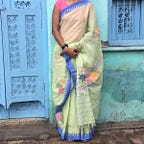Today is International Menstrual Hygiene Day. Instituted in 2014 by WASH, Germany, the day sees events across countries with individuals and organizations raising their voices to break the silence around a natural, biological function.
Reflecting on menstruation and what it means to be a menstruator, a great many other related aspects come to the forefront. Sexual health, identity and agency, financial constraints, violence and abuse, access to education, water and basic sanitation, gender equality etc. As one spends time staying with conversations across these different aspects, it is apparent that an involuntary, physiological activity has been defining in so many ways, keeping half the population restrained from reaching their complete potential.
My journey with menstruation saw me use cotton wrapped in gauze, cloth, bulky washable cloth pads, disposable pads, tampons, lightweight cloth pads and finally menstrual cups. I’ve had rashes, worried myself silly about menstrual odour and also stained my clothes and bed linen more than once. Waking up when on my period would mean a calculated dash to the bathroom to make sure the lumpy blood would not be overwhelming and stain my panties. As I type this, I am aware of the great privilege I’ve had to be able to manage my monthly cycles with ease.
A couple of years ago, I got the opportunity to work on a project in the space of menstrual hygiene and that was the start of a deeper journey into what it meant to menstruate. I had already switched to Ecofemme cloth pads about 6 years ago when I picked up their products from their stall at a marathon expo. Needless to say, there was no looking back after that. I continued using them until I switched to menstrual cups when I commenced work on this assignment. I still use their cloth pads when there isn’t much bleeding.
While I knew about cups, I sat on the fence since I wasn’t too keen on inserting something into my vagina. This after two normal, vaginal births. But it is a fear that is common among many women. It did take me a couple of cycles to get comfortable with the menstrual cup but this method has been extremely liberating. As a relatively active person, it allowed me to enjoy swimming and extended time outdoors without chafing or worrying about disposal. My only regret is not making the switch earlier. I’m glad though that my daughters use sustainable options of cloth pads and/or menstrual cups. It makes me glad that as a family of 3 menstruators, we contribute in a small way to reduce the load on those who handle our everyday waste and overflowing landfills.
‘Sustainability’ has become a word that I tend to feel a little jaded about since it is a saleable hashtag but the fact remains that until about half a century ago, we were a sustainable citizenry. We were mindful about our everyday living; things were repaired, reused, recycled, upcycled and only at the very end, discarded. Somewhere, we lost touch with things that sustain us like the earth and water. Switching to a way of living without burdening the planet is one way to regain that essential connection.
If you’re thinking about switching to a more sustainable way of managing your periods or would like to share about it in groups especially in communities that may not have access to a digital platform, I would be happy to help. Please feel free to connect with me via e-mail here, sonia.m@mytaracup.com
